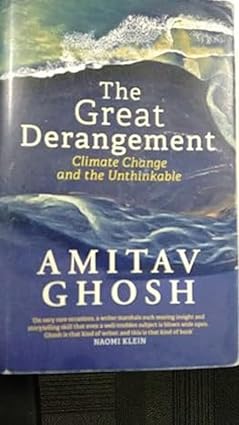
Availability
available
Original Title
The Great Derangement Climate Change and the Unthinkable
Subject & College
Series
Publish Date
2016-07-12
Published Year
2016
Publisher, Place
Total Pages
284
ISBN 10
9780670089130
ISBN 13
978-0670089130
Format
HARDCOVER
Language
ENGLISH
Weight
400G
Average Ratings
Readers Feedback
The Great Derangement: Climate Change and the Unthinkable
On to The Great Derangement then. Written over a decade after The Hungry Tide, this is Amitav Ghosh pondering his profession, and wondering why literary...Read More
Dr. Rupali Phule
The Great Derangement: Climate Change and the Unthinkable
On to The Great Derangement then. Written over a decade after The Hungry Tide, this is Amitav Ghosh pondering his profession, and wondering why literary fiction has such as hard time addressing climate change. The moment a writer sets a book in a radically altered world, it gets pegged as science fiction – which isn’t taken seriously. This matters, he suggests, because literary fiction is one of the ways to track the stories that a society is telling about itself. Since it is so easily framed as a work of speculative imagination, fiction seems to be incapable of talking about climate change as reality. ItIn this series of essays, titled ‘stories’, ‘history’ and ‘politics’, Ghosh explores other ways that climate change becomes unthinkable. One section looks at the possibility of a cyclone hitting Mumbai. It’s not an area that has experienced cyclones historically, but in a changing climate nothing is so predictable. Other areas of the Arabian Sea that also thought they were immune have been hit recently. Ghosh investigates the likely consequences of a cyclone in one of the world’s most densely populated cities, the number of vulnerable people, the repercussions for India’s economy, the possibility of evacuating 18 million people. I found it chilling in a way few climate change books are, even the ones that try to be. But there are no plans for evacuating Mumbai, or for shoring up its defences. It is to all intents and purposes unthinkable.
Ghosh talks to his elderly mother who lives in a flood-prone area. Would his relatives consider leaving the family home and moving to safer ground? Of course not. “To abandon the homes that have given our lives roots, stability and meaning, is nothing short of unthinkable”. And that is true of countless coastal communities, including the Sundarbans, that are right in the teeth of climate change. Ghosh describes the conversation with his mother, and decides he cannot press her on it, recognising that “contrary to what I might like to think, my life is not guided by reason; it is ruled, rather, by the inertia of habitual motion.”
There’s a lot more I could share, including how novels tell individual stories and sideline collective experience, risk and how we handle it, and how the Western model of development cannot be universalised. As an Indian writer, he points out the critical role that Asia plays in climate change, something I will come back to. He writes intelligently about the legacy of empire, and how taking climate change seriously would mean rebalancing historical inequalities. And of course he comments on his own writing, which added depth to my reading of The Hungry Tide. You’ll get the most of of The Great Derangement if you’re specifically interested in his main concern, which is the role of climate change in literature, but it’s a book full of insights and unusual perspectives.
